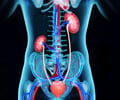- Kidney failure is a frequent and common complication in cancer patients.
- Scientists have found neutrophils to be a promising target for treating kidney failure in cancer patients.
- Inhibiting the enzyme GSK484 could be effective in preventing the formation of NETs in the mouse and human neutrophils in test tubes.
The study findings suggest neutrophils (a type of white blood cell) to be a promising target for developing future therapies to treat kidney injury in cancer patients.
How Neutrophils Play A Role
Neutrophil cells are a type of white blood cells that play an important role in the immune system to protect against infections.
Cancerous tumors may trick the neutrophils to become activated even in the absence of infections, and as a result, this would lead to the progression of the disease and tissue damage.
Anna-Karin Olsson, researcher at the Departmental of Medical Biochemistry and Microbiology at Uppsala University, said, "We have previously demonstrated that neutrophils form so called neutrophil extracellular traps, NETs, in the vasculature of mice with cancer, which cause impaired blood flow and inflammation in organs such as kidneys. Our new findings show that this leads to decreased kidney function in mice with cancer."
Restoring Kidney Function in Cancer Patients
The research study revealed treatment that could restore the kidney function in mice with cancer.
Although, previous studies show inhibitor (GSK484) to be effective in preventing the formation of NETs in the mouse and human neutrophils in test tubes.
This research study is one of its kind to depict the potential of GSK484 inhibitor to prevent the kidney damage in mice with cancer.
Jessica Cedervall, researcher at the Department of Medical Biochemistry and Microbiology at Uppsala University, said, "We believe that these findings can lead to novel treatment options to prevent kidney damage and improve survival rates in cancer patients."
Renal Failure in Cancer Patients
Kidney failure is a common complication in cancer patients. Acute renal failure has potential dangers in allowing the patients to receive optimal treatment.
Some of the risk factors for kidney injury in cancer patients include
- Old age
- Chronic kidney disease
- Sepsis
- Exposure to nephrotoxins
- Obstruction in physiology
- Acute renal failure in cancer patients. - (https://www.ncbi.nlm.nih.gov/pubmed/15902843)
- Acute Kidney Injury in the Cancer Patient - (http://www.ackdjournal.org/article/S1548-5595%2813%2900123-7/abstract)
Source-Medindia














